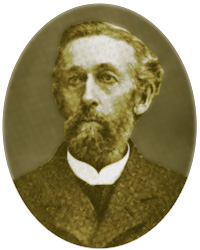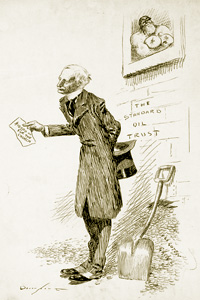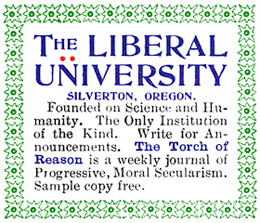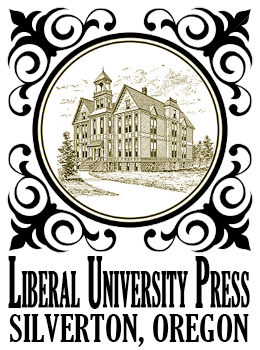By E.W. Kenyon — March, 1903
 Chicago, IL: There is probably no subject, at present, more alive and interesting to all classes of people than that of economics. It fills the very intellectual atmosphere we breathe, even attracting the attention of the unthinking. We hear it from rostrum, press and pulpit. It generally takes an earthquake to set the masses to thinking. Our great anthracite coal strike has furnished the earthquake that has been a great eye opener and set everybody to thinking. During the last thirty years the enormous and rapid accumulation of wealth and power in the hands of a few individuals has been comparatively unnoticed in its profound significance; until the great strike taught the imminent danger of individual monopoly of the necessities of the people, and it is becoming more and more apparent to the masses that any power which can monopolize their necessities can make them slaves.
Chicago, IL: There is probably no subject, at present, more alive and interesting to all classes of people than that of economics. It fills the very intellectual atmosphere we breathe, even attracting the attention of the unthinking. We hear it from rostrum, press and pulpit. It generally takes an earthquake to set the masses to thinking. Our great anthracite coal strike has furnished the earthquake that has been a great eye opener and set everybody to thinking. During the last thirty years the enormous and rapid accumulation of wealth and power in the hands of a few individuals has been comparatively unnoticed in its profound significance; until the great strike taught the imminent danger of individual monopoly of the necessities of the people, and it is becoming more and more apparent to the masses that any power which can monopolize their necessities can make them slaves.
Many eminent and conservative statesmen have recently pointed out that the centralizing power of the monopolistic trusts is inimical to the rights and interests of the people; hence the widespread agitation to curb the power of injustice and tribute concealed in the trusts. On the field of economics are encamped two antagonistic forces; exclusive individualism, and altruistic mutualism; ultra-conservatism, and progress; the former are championed by the church and the privileged classes; the latter by the real friends and would-be benefactors of all mankind.
The most numerous, powerful and organized body of the latter are the Socialists. The Catholic church hates socialism as the devil does holy water, and Protestantism only in less degree, and all ultra-conservatism seeks to make a bugaboo of the word, deeming their contemptuous ostracism of greater popular power than their arguments. Doubtless encouraged by their success in making the word infidel a contemptuous epithet, it has been found this method more easily silences opposition than honest argument.
Christianity always has and does stand, first, for the divine right of the church; second, for the divine right of property, however acquired. Assuming the superiority of the aristocracy of wealth, privilege and arbitrary rights. It is the gospel of greed, unrestrained individualism and selfishness versus the socialistic or mutualistic principle which stands for intellectual freedom in the realm of mind; and in economics, for justice, equal opportunities, happiness, best good of all, and the protection of the poor and weak against the greed of the strong; for the natural rights of man against the so-called divine right of property, king, priest, or unjust social order.
Who are the real friends of the people—those who seek to oppress and rob them, or those who would elevate them and give them all their rights? Who are striving for the real brotherhood of man—Germany’s great Christian warlord, who is straining every nerve to strengthen his army and build up a great navy, or the two million of his socialistic subjects who are striving to abolish both in the interest of peace, prosperity, and brotherhood?
Wolf von Schierbrand says, “The German press is now almost as effectually muzzled as that of Russia, lowering the national standard of political thought and liberty.” And that “the press of the Socialist party is practically the only bulwark now left on behalf of even the moderate degree of freedom that existed under former sovereigns, and Kaiser Wilhelm hates the Socialists bitterly.”
Another object lesson is France, where the Socialists, led by M. and Jean Jaures, are striving for gradual disarmament and universal peace. And thus after twenty centuries of the reign of the Prince of Peace we find all Christian nations impoverishing their people preparing for war with each other, and the only powerful and organized protest coming from a society the universal church brands as the enemy of religion.
In a notable attack on trades unionism and mutualism the Rev. Dr. Newell Dwight Hillis, in a recent sermon in Chicago, championed individualism in economics and in Christian teaching from the text, “Let every man bear his own burdens.” Very good. But the doctor says nothing about the unjust burdens forced on us by others—like doubling the price of coal and the necessities of life to make a few individualistic millionaires; those burdens that greed and selfishness, through special privileges, Impose on the less fortunate.
Bear your own burden is not the question, but must we bear burdens to make others rich? The doctor champions the universal church view, that all reforms must come from the individual, and says, “Our soft and luxurious age wishes to escape responsibility. It traces all troubles hack to institutions on the outside instead of to individuals on the inside;” and says, “Is a man a drunkard, a tramp a vagabond? Blame competition, corporations, anybody excepting the individual who loves idleness and hates work.”
True to the ecclesiastical idea the doctor claims that “Jesus Christ has an instant remedy, but it is the remedy for the individual, ‘Ye must be born again.'” And farther says, “Christ’s philosophy of life, not less than Paul’s, is the philosophy of individual excellence—that is the spring of social happiness and progress.” Like all priests and clergymen he thinks that to be born again and become a Christian is a panacea of all our ills, economic and otherwise.
 Does the world’s history substantiate any such claims? Take, for instance, John D. Rockefeller (right); he typifies individual development. He has been born again, is a good Baptist, does not go to the theater; his status fully fills the orthodox receipt for “individual excellence.” But how did the born again doctrine and individual excellence benefit the competitors that he mercilessly crushed through the sharp and unjust scheme of rebates, whereby he got a refund of fifty per cent of freights on his own as well as on all competitive shipments? Or how does the new birth panacea benefit the people of America who will be forced to quit using oil or else donate ninety-three or more millions a year to the needy Mr. Rockefeller and his poor associates, because of a four cent wholesale advance on oil from September to December?
Does the world’s history substantiate any such claims? Take, for instance, John D. Rockefeller (right); he typifies individual development. He has been born again, is a good Baptist, does not go to the theater; his status fully fills the orthodox receipt for “individual excellence.” But how did the born again doctrine and individual excellence benefit the competitors that he mercilessly crushed through the sharp and unjust scheme of rebates, whereby he got a refund of fifty per cent of freights on his own as well as on all competitive shipments? Or how does the new birth panacea benefit the people of America who will be forced to quit using oil or else donate ninety-three or more millions a year to the needy Mr. Rockefeller and his poor associates, because of a four cent wholesale advance on oil from September to December?
The poor stockholders of the Standard Oil Company only got forty million dollars divided last year, and it may be Mr. Rockefeller needed a hundred million or so more to boom the born again business, or to help perpetuate orthodox economics and orthodox religion. And, besides, the people have been fooled, if in their simplicity they trusted Mr. Rockefeller would not water the stock of the Standard Oil Company because he had been born twice, and had full scope to exercise his “individual excellence.”
Another blossom of unchecked individualism very much in evidence of late is the divinely appointed, by the grace of God, Mr. Baer, who is one of “the Christian men to whom God, in his infinite wisdom, has given control of the property interests of the country.” He too has been born again, but that does not prevent his company from charging three-fold freight on anthracite as compared with bituminous coal and other commodities.
This specimen of individual aggressiveness has of late acquired great notoriety for his piety and uncompromising hostility to the public welfare in general, and that of the miners in particular, Of him and his associate companies Ernest H. Crosby has to say:
“The plain facts of the coal trade are that coal that costs the mine owners $1.87 at New York sells there for five to six dollars a ton in ordinary times” (this winter $12 or more). “This enormous profit, with a small deduction for the retailers’ commission, goes into the pockets of the monopoly and the taking of it is as much a crime as if the flesh and blood of the miners and breaker boys were minted into coin. It is money screwed out of the wretchedness of fellow men. It is intolerable that the growth of great fortunes should be fertilized by human misery.” —January Arena.
Of Baer and his associates, ex-Attorney General Richard Olney exclaimed: “Who are they who are so insistent on suppression of lawlessness in the mining regions? Why, the most unblushing and persistent of lawbreakers. For years they have defied the laws of Pennsylvania, which forbids common carriers engaging in the business of mining. For years they have discriminated between customers in the freight charges on their railroads, in violation of the interstate commerce law. For years they have unlawfully monopolized interstate commerce, in violation of the Sherman anti-trust law. Indeed, the very best excuse and explanation of their attitude is that, having violated so many laws for so long and so many times, they may rightfully think they are wholly immune from either punishment or reproach.”
One thing is sure, that we cannot trust the individualism of Rockefeller, Baer and all the other captains of industry to be pioneers in the field of altruism or a just system of industrialism. It seems to me that two thousand years’ trial of the individualistic principle in economics is a sufficient trial, and inasmuch as it has culminated in the era of greatest greed that the world ever saw—a greed that permeates all classes and conditions, tending to nullify the very foundation of morals, justice, brotherhood and honest dealing. It is about time to initiate some more hopeful system of doing justice to our fellow men.
Compare ecclesiastical individualistic philosophy of selfishness and greed with the broader and deeper insight and sympathy as expressed by Martin S. Knapp, chairman of the Interstate Commerce Commission, who says, “The time is fast approaching when corporations will absorb all important undertakings” (Senator Hoar in his recent great speech on trusts showed the possibility of a few or even a single trust controlling all the necessities of the people), and that “the legitimate and inevitable offspring of corporations is monopoly. We are now at the beginning of a critical transitional period in which the whole structure of industry and social life is liable to be subjected to a strain for which experience furnishes no guiding precedent. Can we raise the wide realm of industry from selfishness to charity, from strife to friendship, from competition to co-operation, from the warring instincts of the savage state to the larger and nobler needs of associated life?” No; priest, clergyman, and ultra-conservative, your “born again” and “individual excellence” panacea has, after centuries of trial, utterly failed to evolve a just economic and industrial system, but the dawn of co-operation and mutualism gives hope to the toiling millions and economic evolution is tending “to the larger and nobler needs of associated life.” The more complex society becomes the greater the necessity of self-surrender and the greater social necessity and benefit of checking predatory individualism.
Co-operative democracy will vastly elevate the masses without lowering ability or genius. It will not put “Shakespeare to dropping white beans,” but will demand more Shakespeares, because a vastly larger number would have sufficient leisure and culture to appreciate him. It would promote honesty, good will and brotherhood, because justice would prevail. The love of philosophy, culture and science would supersede the inordinate love of gold. Individualism of the highest order would be vastly enhanced and legitimately employed without wronging its neighbor.
The inexhaustible problems of the universe would lure and fascinate ability and genius. The noblest and the greatest individuals have been the unselfish benefactors of mankind, like the scientists, who, free from greed, ask not gold for their priceless discoveries, but freely give them, an everlasting heritage, to elevate and uplift all mankind. Altruism has produced great individuals, wherever it has been tried. Andrew D. White says of Pinel and Tuke, that “they stand with Grotius, Thomasius and Baccara—the men who in modern times have done most to prevent unmerited sorrow.”
Like Lister, who discovered the germicide system, whereby humanity has been forever relieved from so much sorrow and suffering, these noble men did not toil for greed of gold. They sowed for other to reap, instead of reaping what others sow, as do our great captains of industry. This sordid age, the blossom of predatory individualism, forgets or does not know its real benefactors.
It rears monuments to its Napoleons, who slaughter their fellow men; but it neglects graves of its greatest benefactors, and makes pilgrimage to the tombs of worthless saints. It worships mammon and values riches above man. So long as society gives individuals or corporations special privileges and license to lay tribute and unjust burdens upon others, there ca11 be no brotherhood of man. The leopard never changes its spots. The individual, as the “soulless” corporation and priest always has and, uncontrolled, always will work for selfish ends.
The salvation of society is to evolve a system that will make it impossible for followers of greed and mammon to degrade and impoverish their fellow men. The morals and the justice must he embodied in the system and not entrusted— to individual excellence. Not but that individual excellence is a noble thing; but what we need is an economic system founded on the eternal rock of universal justice that will make its existence possible instead of logically producing monstrous greed.





